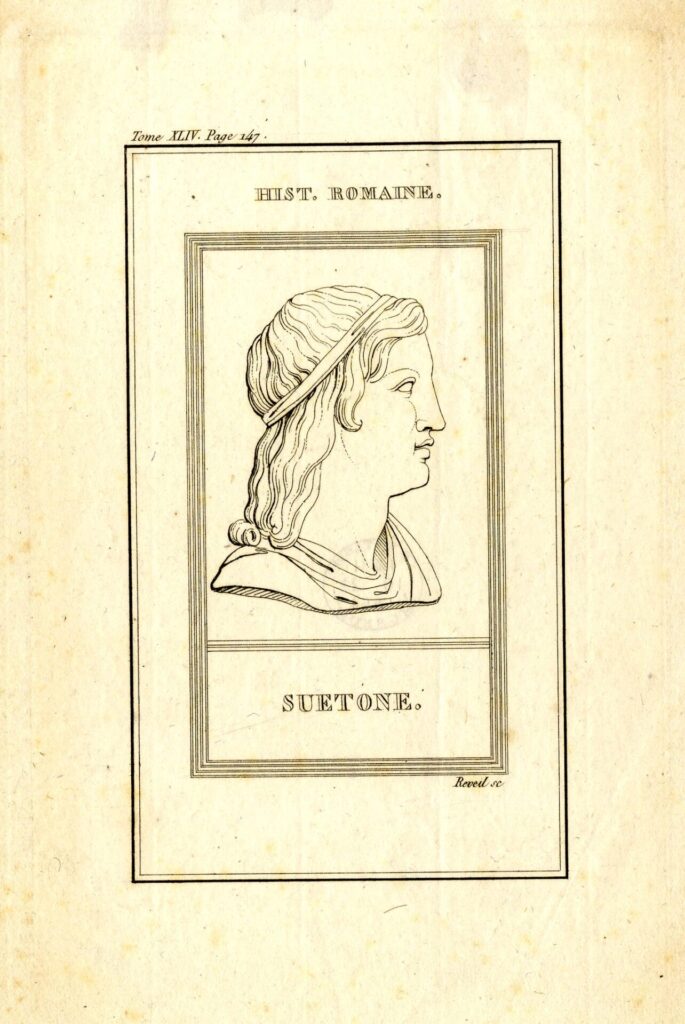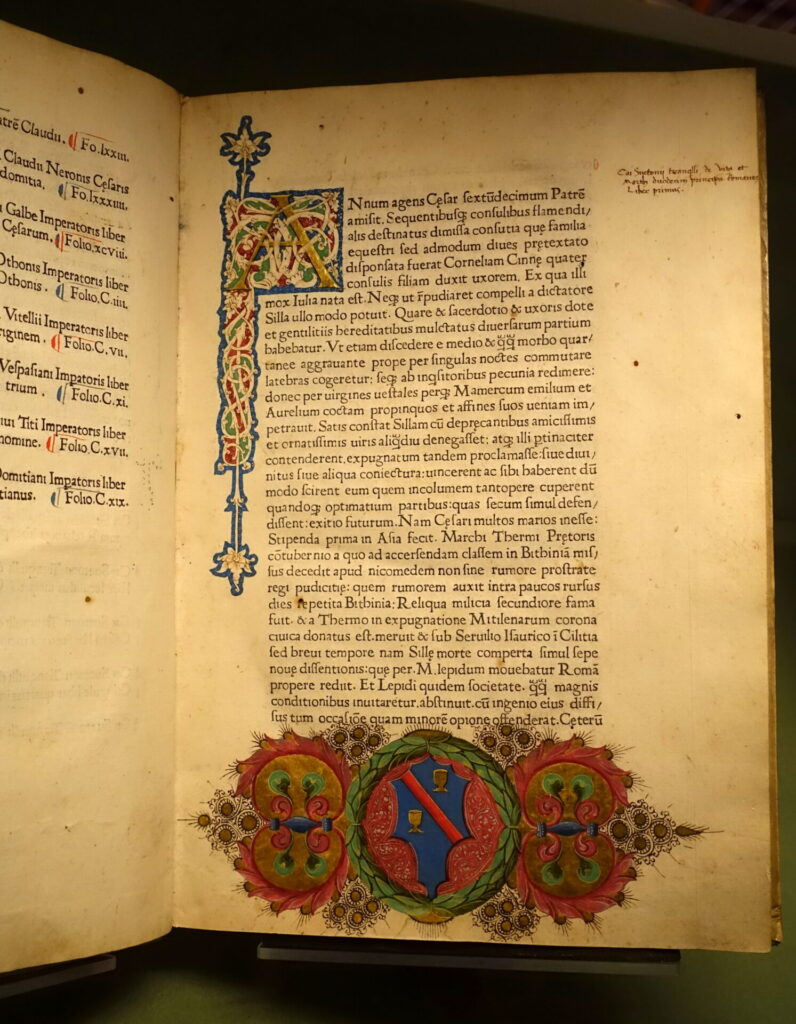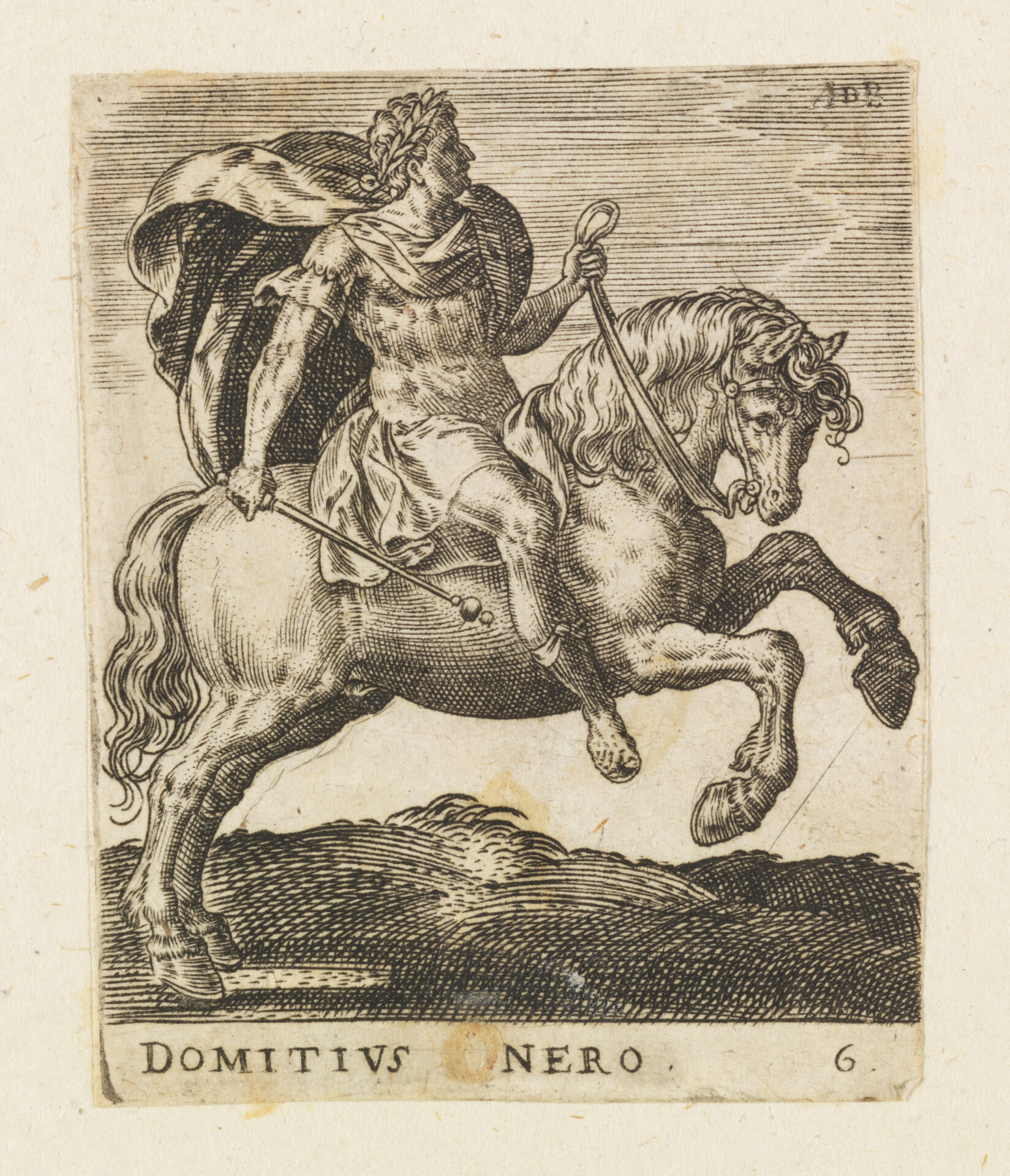Introduction – Meet the man who revealed the emperors’ private lives
Long before tabloids, before paparazzi, and even before Tacitus’ sharp political commentary, there was Suetonius. He was Rome’s original biographer of powerful people. Gaius Suetonius Tranquillus wanted to introduce the famous rulers behind the facade of imperial Rome to expose what lay beneath: ambition, cruelty, love affairs, omens, quirks, and gossip. His portraits of the first twelve emperors have defined their reputations for nearly two millennia. Whether you picture Nero playing the lyre during a fire or Caligula making his horse a consul, odds are Suetonius is why.
But Suetonius was no sensationalist hack. He was a highly educated man, a member of the Roman equestrian class, and a close observer of the imperial court. He combined official records with juicy anecdotes, delivering very interesting biographies that still grip modern readers. His work, The Twelve Caesars, remains one of the most influential sources for early imperial history, not because he always told the truth, but because he told stories people remembered.
Life and times – A quiet man in a turbulent age
Suetonius was born around 69 AD, in a year remembered for chaos as the Year of the Four Emperors. Though the details of his birthplace are unclear, some sources suggest Hippo Regius in modern Algeria, while others place him somewhere in Italy. His family belonged to the equestrian order, the Roman social class just below the senators, allowing him access to education, culture, and administrative careers.
Unlike Tacitus, who rose through senatorial ranks, Suetonius never held high political office. Instead, he cultivated a quieter life, focused on study, literature, and imperial service. He became friends with Pliny the Younger, a prominent senator and writer, who praised Suetonius’ character and even helped him secure patronage under Emperor Trajan.
His most significant post came under Emperor Hadrian, when he served as secretary of correspondence. In this role, he handled the emperor’s letters and had access to private archives and sensitive documents, which was an ideal position for someone obsessed with facts and imperial personalities. A little bit less with facts. However, he lost Hadrian’s favor, possibly due to violating court protocol, and was dismissed, along with several others, around 122 AD. Still, Suetonius’ proximity to power had already served his literary mission.

The Lives of the Caesars – his most famous work
Suetonius’ legacy comes from his masterpiece De Vita Caesarum, or The Lives of the Caesars. The collection includes biographies of Julius Caesar and the first eleven emperors of the Julio-Claudian and Flavian dynasties, ending with Domitian.
The structure of each biography is not strictly chronological. Instead, Suetonius focuses on key themes: family background, rise to power, military and political achievements, personality traits, private habits, and ultimately their death. This thematic approach gives readers a layered understanding of each figure, even if it sacrifices historical sequence.
What makes these lives unforgettable is the balance between public record and private life. Suetonius didn’t just record battles and laws—he told us which emperor was generous, who had a cruel sense of humor, whose diet was peculiar, and who feared lightning. He included omens, portents, dreams, bedroom rumors, and even fashion choices. For example, he wrote that Augustus preferred simple clothing, while Nero was obsessed with singing and performing on stage. His work is based on a wide range of sources: official decrees, Senate records, witness testimony, imperial letters, and oral tradition. Sometimes he signals when a story may not be true, but he often leaves the judgment to the reader.

Historian or gossip columnist?
Modern historians are divided on how to categorize Suetonius. Was he a careful biographer, or the ancient world’s equivalent of a tabloid writer? The answer may be: a bit of both.
On the one hand, Suetonius preserved facts that no one else did. His attention to detail, archival access, and methodical structure reflect the habits of a serious compiler of imperial lives. He often uses neutral or even sympathetic tones, particularly with Augustus and Vespasian. His biographies avoid heavy moralizing or overt political critique—unlike Tacitus, whose disdain for tyranny is clear.
On the other hand, Suetonius clearly enjoyed the sensational. He seemed fascinated by emperors’ private behaviors, especially sexual habits and superstitions. He describes Caligula’s alleged incest, Domitian’s cruelty, and Nero’s theatricality with relish. He even notes Tiberius’ retreat to Capri and the rumors of sexual depravity, though he distances himself from fully endorsing the claims. For some, this makes him unreliable. For others, it’s precisely why he’s valuable: he captured what people in Rome whispered about—the unofficial history of power.

Other works – beyond the Caesars
Although The Twelve Caesars is his only surviving major work, Suetonius was a prolific author. He wrote a series of biographies called De Viris Illustribus (On Famous Men), which included sections on poets (De Poetis), grammarians (De Grammaticis), rhetoricians (De Rhetoribus), and historians. Only a few fragments of these texts survive, but they show his wide-ranging interests beyond politics.
In these works, Suetonius focused on intellectual and literary figures of Rome, collecting anecdotes about their lives, quirks, and careers. He applied the same thematic approach—less chronological, more personal. For example, in his fragments on grammarians, he recounts disputes between teachers, classroom discipline, and philosophical debates. He also compiled works on Roman customs, festivals, clothing, and religious practices. These are now lost, but they indicate his broader goal: to preserve Roman culture through storytelling. Suetonius was more than an imperial gossip; he was a cultural historian of everyday Roman life.
Legacy and influence – from antiquity to today
Suetonius’ influence outlived the empire. His style and substance shaped how later generations saw Rome’s emperors. Medieval chroniclers and Renaissance humanists read The Twelve Caesars not just as history, but as moral instruction and drama. During the Renaissance, figures like Petrarch and Boccaccio were fascinated by his portrayals of power and personality.
In modern times, Suetonius’ biographies are still widely quoted in biographies, academic studies, and even popular media. Hollywood versions of Rome, from I, Claudius to Caligula, often draw directly from his pages. Still, historians continue to debate his value. While he lacks the gravitas and complex analysis of Tacitus or the philosophical depth of Plutarch, Suetonius provides a different kind of truth: the inner atmosphere of the Roman court. He helps us understand not just what emperors did, but how they were perceived by those around them.
Some scholars have defended him against charges of frivolity, noting his methodical sourcing and balanced portrayals—Augustus, for example, is praised as much as criticized. His avoidance of heavy-handed ideology makes him, in some ways, more accessible to modern readers.
Suetonius wasn’t interested in epic battles or senatorial debates. He didn’t even mention the conquest of Britain. He wanted to know what time the emperor woke up, what he ate, who he loved, and what dreams disturbed his sleep. His biographies remain essential reading not only because of their historical value, but because they explore the human side of power—its fragility, vanity, cruelty, and charm.
In a world where public image and private reality often collided, Suetonius recorded both. Through him, the emperors of Rome come alive—not just as rulers, but as men. Whether you admire him for his insights or question his motives, there’s no denying that Suetonius pulled aside the curtain, and the Roman world was never the same again.
Hello, my name is Vladimir, and I am a part of the Roman-empire writing team.
I am a historian, and history is an integral part of my life.
To be honest, while I was in school, I didn’t like history so how did I end up studying it? Well, for that, I have to thank history-based strategy PC games. Thank you so much, Europa Universalis IV, and thank you, Medieval Total War.
Since games made me fall in love with history, I completed bachelor studies at Filozofski Fakultet Niš, a part of the University of Niš. My bachelor’s thesis was about Julis Caesar. Soon, I completed my master’s studies at the same university.
For years now, I have been working as a teacher in a local elementary school, but my passion for writing isn’t fulfilled, so I decided to pursue that ambition online. There were a few gigs, but most of them were not history-related.
Then I stumbled upon roman-empire.com, and now I am a part of something bigger. No, I am not a part of the ancient Roman Empire but of a creative writing team where I have the freedom to write about whatever I want. Yes, even about Star Wars. Stay tuned for that.
Anyway, I am better at writing about Rome than writing about me. But if you would like to contact me for any reason, you can do it at contact@roman-empire.net. Except for negative reviews, of course. 😀
Kind regards,
Vladimir
